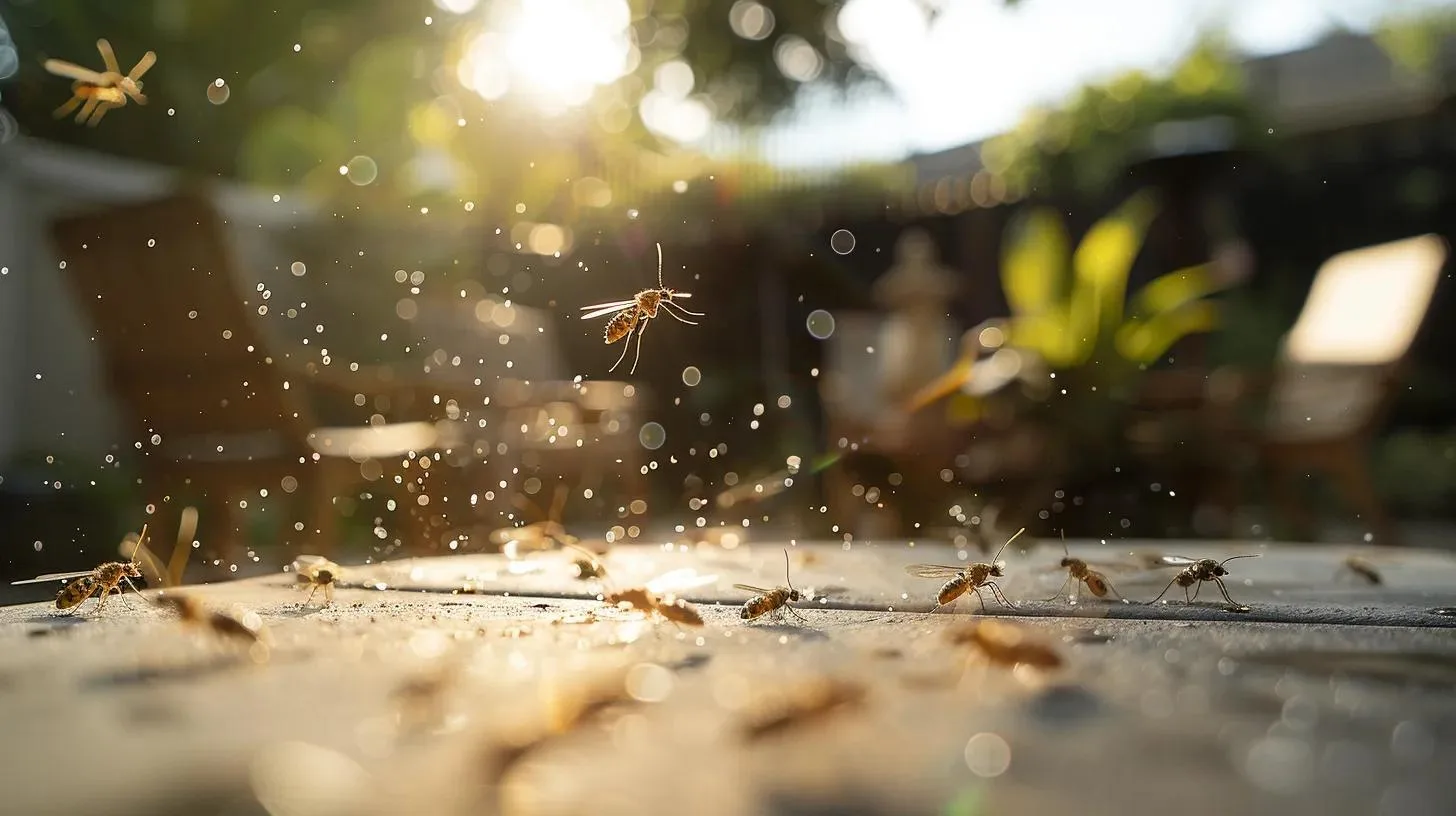Summer Pests You Need to Know About
In the heat of summer, homeowners and gardeners face increased pest activity that can disrupt home comfort and garden productivity. Mosquitoes, termites, ants, ticks, and spiders become more active as the weather warms, seeking food, water, and shelter. This article provides a comprehensive guide on the most common summer pests, outlining how to identify them, prevent infestations, treat problems, and use eco-friendly control methods. It also discusses the diseases these pests can transmit, ensuring that you protect your property and your health.
Understanding summer pest behavior is key to effective pest management. Higher temperatures and moisture create ideal conditions for many species. For example, mosquitoes multiply rapidly in stagnating water and can transmit diseases such as dengue fever, Zika virus, and West Nile virus, while ticks become more aggressive and may spread Rocky Mountain spotted fever. Ants, termites, and spiders, although generally less immediately dangerous, may cause structural damage or provoke anxiety when infestations go unnoticed.
This guide is designed to help homeowners, pest management professionals, and community members understand common summer pests. It describes pest characteristics, potential health risks, and provides methods for identification, prevention, and treatment. In addition to conventional chemical options, eco-friendly alternatives are discussed to ensure sustainable pest control without harming the environment. Practical tips and step-by-step instructions offer a strategy to tackle summer pest problems effectively.
Transitioning to the main sections, the article is organized into parts addressing common pest types, prevention measures, treatment options, disease transmission, eco-friendly methods, and home preparation techniques for the summer pest season.
Key Takeaways
- Summer increases pest activity, making early identification and prevention essential.
- Mosquitoes, ticks, ants, termites, and spiders are among the most common pests.
- Effective prevention and treatment include both DIY strategies and professional services.
- Eco-friendly methods and proper maintenance can reduce pest infestations sustainably.
- Understanding pest-borne diseases is crucial for keeping your family safe.
What Are the Most Common Summer Pests to Watch For?

During summer, pest problems begin with increased insect activity in both residential and commercial areas. Experts cite mosquitoes, ticks, ants, termites, and spiders as primary pests, each showing unique behaviors that intensify with the heat.
Which Mosquito Species Are Active in Summer and How to Identify Them?
Mosquitoes are notorious for their bites and disease transmission. Common summer species include Aedes aegypti and Culex pipiens. Aedes are smaller with white markings and stripe patterns on their legs and bodies, whereas Culex tend to be brownish. Mosquitoes lay eggs in stagnant water found in containers, clogged gutters, or plant saucers. Early identification through inspection of these habitats allows for prompt intervention using larvicides, insect growth regulators, or natural predators. Homeowners should also eliminate standing water to control breeding.
Routine monitoring with professional inspections or DIY traps is key. Public health agencies provide guidelines for mosquito control and integrated pest management combining chemical, biological, and mechanical methods to lower populations while protecting the ecosystem.
How to Recognize Ticks and Understand Their Risks?
Ticks, found in grassy, wooded, or bushy areas, pose serious health risks. Common species include the black-legged tick, associated with Lyme disease, and the American dog tick. They are small, flat, and can be brownish or reddish. Ticks attach firmly to skin and feed over several days, transmitting diseases like Rocky Mountain spotted fever and ehrlichiosis. Regular inspection of pets and family members after outdoor activities is important. Removal with tweezers shortly after detection—before the tick’s blood clot-preventing secretions increase transmission risk—is recommended. Routine yard maintenance, trimming grass, and removing leaf litter are effective preventive measures.
What Types of Ants Invade Homes and Gardens in Summer?
Ants become more problematic in summer as colonies expand. Carpenter ants, pavement ants, and fire ants are frequently encountered. Carpenter ants nest in wood and may damage structures, pavement ants build nests under sidewalks, and fire ants form mounds and can deliver painful stings. Identification is based on behavior and habitat—carpenter ants are larger and dark, pavement ants create visible trails, and fire ants have a reddish hue. Preventative strategies include sealing entry points, keeping kitchens clean, and using baits or natural deterrents. In severe cases, professional pest control may be required.
How to Spot Termite Activity During Summer Months?
Termite activity increases in summer as warm weather accelerates foraging. Subterranean termites are common and can cause extensive damage to wood structures. Indicators include mud tubes along walls or foundations, discarded wings near windows, and hollow-sounding wood. Early detection via regular inspections of basements, attics, and wood structures is essential. Swarming events, when winged termites seek new colonies, also signal infestations. Preventative measures include removing excess wood debris, keeping wood away from soil, and repairing water leaks. Modern treatments use baiting systems and liquid termiticides to target colonies effectively.
Which Spiders Are Common in Summer and Are They Dangerous?
Spiders become more visible in the summer. Common types include harmless garden and orb-weaver spiders, along with potentially dangerous species like the black widow and brown recluse. Black widows are recognized by the red hourglass marking on their abdomen, while brown recluses have a violin-shaped marking. Although most spiders help control pest populations, venomous ones require caution. Reducing clutter, using sticky traps, and sealing entry points are effective prevention strategies. For those with severe allergies or concerns, professional pest control can be consulted.
How Can You Prevent Summer Pest Infestations Effectively?
Preventing infestations in hot, humid summer months requires a proactive approach that combines proper home maintenance, behavioral changes, and timely interventions. Effective prevention minimizes both pest presence and the risk of pest-related diseases.
What Are the Best Mosquito Bite Prevention Tips?
Preventing mosquito bites begins with eliminating breeding grounds such as stagnant water in gutters, bird baths, and containers. Installing window and door screens, wearing long-sleeved clothing during dawn and dusk, and applying insect repellents containing DEET or lemon eucalyptus oil are crucial. Additionally, mosquito traps, fans, and planting repellent vegetation like citronella and lavender can help reduce numbers. Integrated pest management combines these measures with periodic professional treatments for sustained control.
How to Avoid Tick Bites and Reduce Exposure?
To prevent tick bites, wear light-colored clothing to spot ticks more easily, use repellents containing DEET or permethrin, and perform regular tick checks after being outdoors. Stay on well-maintained paths and avoid tall grasses. Homeowners should also reduce tick populations by creating barriers of wood chips or gravel and maintaining a tidy yard through regular mowing, removing leaf litter, and trimming shrubs. These efforts, along with community tick surveillance programs, can significantly lower exposure risks.
What Steps Stop Ants From Entering Your Home?
Keeping ants out of the home involves maintaining high levels of cleanliness, promptly cleaning up food spills, and storing food in sealed containers. Sealing cracks in walls, baseboards, and door frames prevents entry. Using ant baits near visible trails disrupts the colony’s lifecycle. Natural solutions like vinegar or citrus sprays and landscape modifications—such as trimming vegetation away from the house—can further deter ants. For persistent issues, professional pest control can tailor a treatment plan.
How to Prevent Termite Infestations Before They Start?
Prevent termite infestations by reducing wood-to-soil contact; ensure wooden structures are elevated and that debris and decaying wood are removed. Controlling moisture through leak repairs, improved drainage, and using dehumidifiers in vulnerable areas like basements can reduce termite risk. Chemical barriers (termiticides) or physical barriers installed during construction add extra protection, as do regular professional inspections to detect early signs of termite activity.
What Are General Summer Pest Prevention Tips for Homeowners?
A holistic approach to pest prevention includes reducing standing water, maintaining cleanliness, and regular home inspections. Sealing gaps and cracks in the foundation, windows, and doors is essential. Natural remedies, such as pest-repelling herbs and essential oils, can complement conventional methods. Installing screens on windows and doors, adjusting outdoor lighting, trimming shrubbery, and removing yard debris all contribute to an environment that is less attractive to pests. Regular professional inspections further safeguard your property.
What Are the Most Effective Treatment Options for Summer Pests?

When prevention fails and pests invade, effective treatment options range from DIY methods to professional interventions. The decision between manual and chemical treatments depends on the pest type, infestation size, and associated health risks.
When Should You Use DIY Mosquito Control vs. Professional Services?
DIY methods for mosquito control include applying insect repellents, using window screens, and setting traps. Simple measures like citronella candles or essential oil diffusers can be effective for mild cases. However, if mosquito populations grow large or pose disease risks, professional services using targeted fogging or larvicides are recommended. Professionals use specialized equipment and integrated techniques to provide more effective, long-term results.
How to Treat Tick Bites and When to Seek Medical Help?
Proper tick removal with fine-tipped tweezers, followed by cleaning the bite area with soap and water, is crucial. Over-the-counter antiseptics may help prevent infection. However, if you develop symptoms such as a bullseye rash, fever, or chills—which may indicate Lyme disease or another tick-borne illness—seek medical attention immediately. Home remedies can alleviate minor swelling and pain, but professional evaluation is important if symptoms worsen.
What Are the Best Methods to Eliminate Ant Infestations?
Effective ant elimination involves using ant baits that workers carry back to the colony and disrupt the entire population. A mixture of vinegar and water can be used on surfaces to break ant trails. For persistent issues, professionals may use specialized sprays and dust formulations along with sealing entry points to create a physical barrier. Monitoring and early intervention are key to long-term control.
How Do Professionals Handle Termite Control and Inspection?
Termite control by professionals begins with a detailed inspection using moisture meters and infrared cameras to detect hidden infestations. Treatment options include chemical soil treatments, baiting systems, and, in severe cases, fumigation. These methods target the entire colony, including both workers and reproductives. Regular follow-up inspections ensure treatment success and prevent future outbreaks by addressing risk factors like excess moisture and wood-to-soil contact.
What Are Safe Ways to Manage Spiders in and Around Your Home?
For spider management, non-chemical methods such as regular cleaning, vacuuming, and sealing entry points are often sufficient. If spider populations grow or venomous species are identified, low-toxicity insecticides can be used selectively. Natural repellents using diluted essential oils (e.g., peppermint or tea tree) are another safe option. For additional assurance, professional pest control can provide localized treatments to manage high-risk areas without widespread chemical exposure.
Which Diseases Are Transmitted by Summer Pests and How to Stay Safe?
Summer pests are vectors for several diseases that significantly impact human health. Mosquitoes, ticks, and other insects can transmit pathogens, making it critical to understand the associated diseases and take preventive measures.
What Diseases Do Mosquitoes Carry and How to Protect Yourself?
Mosquitoes can transmit diseases such as West Nile virus, dengue fever, Zika virus, and eastern equine encephalitis. Protection involves wearing long sleeves and pants, using DEET-based repellents, and installing window screens. Eliminating stagnant water around your home is also vital to reduce breeding grounds and lower the likelihood of disease transmission.
What Are the Common Tick-Borne Diseases and Their Symptoms?
Ticks are vectors for Lyme disease, Rocky Mountain spotted fever, and ehrlichiosis. Symptoms may include fever, fatigue, red rashes, and joint pain. Regular tick checks after outdoor activities and prompt removal can help prevent disease transmission. Protective clothing and repellents are recommended, and if symptoms develop after a tick bite, medical evaluation is essential.
Can Ants or Spiders Cause Health Issues?
While ants and most spiders do not transmit diseases directly, they can cause indirect health issues. Fire ant stings may trigger severe allergic reactions or anaphylaxis. Spider bites, especially from black widows or brown recluses, can lead to significant localized pain, tissue damage, or systemic reactions. Additionally, ants contaminating food can pose risks if proper hygiene is not maintained. Early recognition and treatment of any adverse reactions are important.
How to Recognize and Respond to Pest-Related Health Emergencies?
Recognizing a pest-related health emergency involves monitoring for severe symptoms such as swelling, difficulty breathing, or extensive rashes from mosquito or tick bites. Should symptoms like high fever, chills, or intense pain occur, immediate medical attention is necessary. Keeping a first aid kit with antihistamines and topical creams can help manage minor reactions while awaiting professional care.
What Are Eco-Friendly Pest Control Methods for Summer Pests?

Eco-friendly pest control methods provide sustainable alternatives to chemical treatments by reducing health risks and environmental impacts. These methods use natural substances, biological controls, and physical barriers to manage pest populations while preserving beneficial insects.
How Do Natural Mosquito Repellents Work?
Natural repellents use botanical extracts and essential oils, such as citronella, lavender, and eucalyptus, to mask human scents and disrupt mosquito sensory receptors. Available in sprays, lotions, or candles, these repellents offer a safer alternative to synthetic chemicals like DEET, though they might require more frequent application. They are most effective when combined with habitat modification to eliminate standing water.
What Eco-Friendly Strategies Prevent Tick and Ant Infestations?
For ticks, maintaining a well-trimmed lawn and removing leaf litter reduces their favored humid environments. Diatomaceous earth, a natural silica-based powder, can be applied around the home to deter tick movement. Ant control can benefit from natural repellents like vinegar or citrus solutions that disrupt trails, as well as physical barriers like copper tape and encouraging beneficial predators such as ladybugs.
How to Use Biological Controls Against Termites and Spiders?
Biological control uses natural predators or pathogens to target pest populations. Certain nematodes and fungi can infect termite colonies, reducing their size without harming plants. For spiders, encouraging bird populations or beneficial insects that prey on spiders can maintain a natural balance. These methods work gradually and support long-term pest management with minimized resistance risks.
When Is Professional Eco-Friendly Pest Control Recommended?
Professional eco-friendly pest control is advised when infestations are severe or persistent despite DIY efforts. Experts practicing integrated pest management (IPM) combine biological, physical, and low-toxicity chemical methods tailored to specific pest challenges. Their comprehensive assessments help modify environmental factors and implement targeted treatments that preserve both health and the surrounding ecosystem.
How to Prepare Your Home and Garden for Summer Pest Season?
Preparation is key to minimizing pest infestations. A proactive maintenance routine reduces pest attractants and eliminates potential breeding grounds, keeping your home and garden comfortable and safe throughout the summer.
What Home Maintenance Tasks Reduce Pest Attraction?
Effective maintenance includes sealing gaps and cracks around doors, windows, and foundations, cleaning gutters to prevent water buildup, and repairing screens. Regular cleaning of patios, outdoor furniture, and compost bins also prevents food sources for pests. Routine checks for decaying organic matter in attics or basements further limit pest habitats. A seasonal checklist for both interior and exterior tasks is recommended for consistent protection.
How to Manage Standing Water and Landscaping to Deter Mosquitoes?
Inspect the yard regularly for puddles, clogged gutters, and containers that can hold water. Treat or eliminate these sources to disrupt mosquito breeding. Landscaping strategies, such as proper grading for drainage, incorporating native drought-resistant plants, and reducing overwatering, help minimize excess moisture. For decorative water features, ensure proper circulation and routine cleaning to prevent stagnation.
What Yard Care Practices Help Prevent Tick and Ant Problems?
Yard care involves keeping grass trimmed, removing leaf litter, and managing dense vegetation to deter ticks. For ants, trim plants away from the house and remove organic debris near the foundation. Natural deterrents like diatomaceous earth or botanical insecticides can be applied along the yard’s perimeter. Periodic professional pest inspections add an extra layer of assurance that emerging issues are addressed early.
When Should You Schedule Professional Pest Inspections?
Scheduling at least one professional pest inspection before summer is advisable. These inspections uncover hidden vulnerabilities, such as moisture issues and concealed entry points, that may be overlooked during routine maintenance. Annual evaluations help implement timely corrective measures and reduce the likelihood of severe infestations during periods of high pest activity.
What Are the Most Frequently Asked Questions About Summer Pests?

The following FAQ section addresses common concerns and practical issues regarding summer pests, empowering homeowners to identify, prevent, and manage infestations efficiently.
How Can I Identify a Mosquito or Tick Bite?
Mosquito bites appear as small, raised, reddish bumps that itch and swell, while tick bites may be less noticeable initially. However, if a tick remains attached, redness, irritation, or a bullseye rash may develop. Monitoring for signs of infection is crucial, and over-the-counter antihistamines can relieve mild symptoms. Consult a healthcare provider if reactions worsen.
What Are the Signs of a Termite Infestation?
Early signs of termite infestations include mud tubes on walls, hollow-sounding wood, and discarded termite wings near doors or windows. Visible damage such as cracking or warping of wood may also occur. Routine inspections are essential to catch termite activity before serious structural damage occurs.
How Do I Know if I Have an Ant Problem?
Ant infestations are usually evident from trails of ants around food sources or visible nests in walls and under floors. Persistent activity despite cleaning suggests that a colony is present. Sealing entry points, using ant baits, and consulting professionals are recommended if the problem continues.
Are All Spiders Dangerous in Summer?
Most spiders found in and around homes are harmless and help control other pests. However, species such as the black widow and brown recluse can cause serious reactions with their venomous bites. Learning to identify these dangerous species and reducing clutter can minimize risks.
What Is the Difference Between DIY and Professional Pest Control?
DIY methods use over-the-counter products and home remedies which may be effective for small infestations. Professional pest control offers tailored treatments using advanced techniques and specialized products, making them more suitable for large or recurring infestations. Homeowners should consider professional help when DIY solutions fail to resolve the issue.
Frequently Asked Questions
Q: Which summer pest is the most dangerous to human health? A: Mosquitoes are considered the most dangerous due to their ability to transmit diseases such as West Nile virus, dengue fever, and Zika virus. Their widespread presence and rapid breeding in stagnant water pose major public health risks.
Q: How can I naturally deter pests from my garden? A: Planting pest-repelling herbs like peppermint, lavender, and marigold can naturally discourage pests. Using organic insecticides or essential oil sprays, along with maintaining a clean, debris-free garden, also helps keep pests at bay.
Q: What should I do if I suspect a termite infestation in my home? A: If you notice mud tubes, hollow-sounding wood, or swarms of winged insects, schedule a professional termite inspection immediately. Early detection is key to preventing extensive structural damage and costly repairs.
Q: Are eco-friendly pest control methods as effective as traditional chemical treatments? A: When implemented consistently, eco-friendly methods such as integrated pest management (IPM) that combine natural repellents, biological controls, and physical barriers can be highly effective for long-term pest control without the adverse effects of harsh chemicals.
Q: How frequently should I have my property inspected for pests during summer? A: It is recommended to have your property inspected at least once before summer and periodically throughout the season, especially in areas prone to high pest activity. Regular inspections help catch early infestations before they become severe.
Q: Can professional pest control services guarantee the complete removal of summer pests? A: While complete eradication can be challenging due to the nature of pests and environmental factors, professional services substantially reduce pest populations and offer ongoing monitoring to prevent recurrence.
Q: What are the primary benefits of integrating eco-friendly pest control in my home maintenance routine? A: Eco-friendly methods reduce reliance on harsh chemicals, improve indoor air quality, preserve beneficial insect populations, and support environmental sustainability, making them a safer choice for families while providing long-term protection.
Final Thoughts

Summer pest infestations present significant challenges, but a well-planned and proactive approach can effectively mitigate these issues. By identifying common pests, employing integrated prevention strategies, and knowing when to seek professional help, you can protect your property and health. Eco-friendly methods and routine inspections add further assurance, ensuring a comfortable, pest-free environment throughout the summer season.

17 Years of Pest Control Experience Founder and Owner of Dade Pest Solutions Proud Resident of South Florida
Shaun Judy, a dedicated South Florida native, is the founder and driving force behind Dade Pest Solutions. With over 17 years of hands-on experience in the pest control industry, Shaun has built a reputation for reliability, results, and real local knowledge. His journey began with a deep commitment to protecting homes from pests using proven methods and innovative solutions. Raised with a strong work ethic and a passion for service, Shaun treats every property as if it were his own—delivering expert care with a personal touch.

